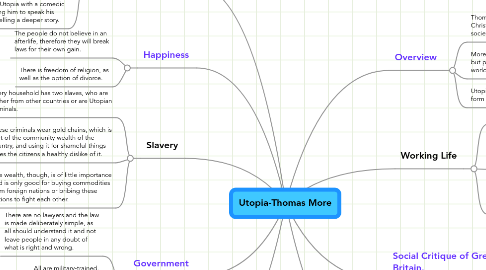Utopia-Thomas More
by Ara Lee


1. Christian Synthesis
1.1. The Christian aspect of the synthesis is Christ's gospel of caring for the poor, the oppressed and the downtrodden.
1.2. The Platonic, Republican tradition is the Greek aspect of the synthesis
1.3. More wrote Utopia with a comedic tone, allowing him to speak his truth while telling a deeper story.
2. Property
2.1. The island contains 54 towns, each with about 6000 households.
2.1.1. New node
2.2. There is no private ownership on Utopia
2.3. There are also no locks on the doors of the houses, which are rotated between the citizens every ten years.
3. Slavery
3.1. Every household has two slaves, who are wither from other countries or are Utopian criminals.
3.2. These criminals wear gold chains, which is part of the community wealth of the country, and using it for shameful things gives the citizens a healthy dislike of it.
3.3. The wealth, though, is of little importance and is only good for buying commodities from foreign nations or bribing these nations to fight each other.
4. Government
4.1. There are no lawyers and the law is made deliberately simple, as all should understand it and not leave people in any doubt of what is right and wrong.
4.2. All are military-trained.
4.3. Women are mostly treated equally, allowed to do the same work as men and educated in the same way as men are.
5. Happiness
5.1. The people do not believe in an afterlife, therefore they will break laws for their own gain.
5.2. There is freedom of religion, as well as the option of divorce.
6. Overview
6.1. Thomas More's Utopia is a Christian-humanist view of an ideal society
6.2. More does not simply offer a theoretical view, but provides specifics for how to create this world.
6.3. Utopia offers a Christianized form of Plato's Republic.
7. Humor and Parody
7.1. Utopia means nowhere
7.1.1. The local political system is called a Sty
